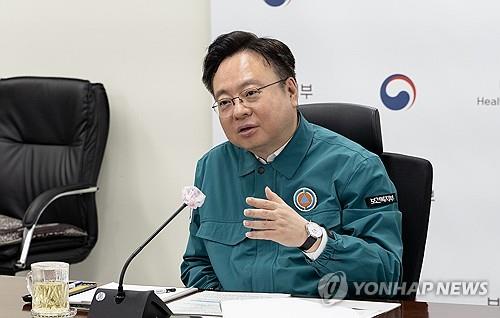(LEAD) S. Korea moving to reform chaebol after Lotte episode
(ATTN: UPDATES with more details in paras 15-19)
SEOUL/SEJONG, Aug. 5 (Yonhap) -- The government and the ruling Saenuri Party are moving to reform the ownership structure of the country's family-run conglomerates amid public backlash over an escalating power struggle in Lotte Group, official sources said Wednesday.
Lotte, South Korea's fifth-largest family-run business group, has drawn harsh condemnation and come under scrutiny after the two sons of group founder Shin Kyuk-ho and other family members have openly squabbled over control of the sprawling retail giant.
Party insiders said Rep. Kim Jung-hoon will chair a meeting attended by Fair Trade Commission (FTC) Chairman Jeong Jae-chan in Seoul Thursday to discuss what measures can be taken to improve how private business groups, commonly known as chaebol, are run.
Kim, Saenuri's chief policymaker, told Yonhap News Agency that the FTC is expected to acquire details on the ownership structure of Lotte's foreign affiliates by Aug. 20.
"The goal of the upcoming meeting is to get an outline of what measures the corporate regulator will take and exchange views on what legal and institutional actions can be taken to tackle the murky ownership issue," the three-term lawmaker said.
He said if the need arises, the parliament can propose a bill that would compel chaebol to reduce cross-shareholding arrangements.
Lotte confirmed that there are 416 cross-shareholding arrangements holding the conglomerate together and this permits the Shin family to control the vast business empire even if they do not personally own a lot of shares.
The founder's stake in the conglomerate stands at only 0.05 percent, with this number rising to just 2.41 percent if stakes held by all family members are tallied.
The country's existing fair trade law bars new cross-shareholding arrangements, but not existing ones.
The lawmaker also hinted that ownership structures of other conglomerates can be checked as well.
"It has been two years since the fair trade law banning new cross-ownership has been passed so it is time for a review," the lawmaker said.
In addition to the ownership structure, Saenuri lawmakers said they may look into the succession process of Lotte as well as how the group is run and how it operates its outside directors, who are appointed to check the power of top managers and protect the rights of investors.
Rep. Shim Jae-chul, another Saenuri lawmaker, even suggested that a tax audit should be carried out on Lotte to see if the conglomerate intentionally dodges taxes.
Related to the meeting, the FTC confirmed it is checking the ownership structure of Lotte's foreign affiliates after it was found that the conglomerate's founder used foreign affiliates to exert control over local companies.
"Under such circumstances, there is a need to determine the exact ownership structure of the business group, including Kwangyunsa and unidentified investment firms," the commission said. "Lotte was told last month to provide all the necessary data."
Kwangyunsa is suspected of being at the center of Lotte's cross-shareholding system that encompasses companies in both South Korea and Japan.
A source said that if the Lotte founder exerted influence through a foreign firm, he is obliged by law to report such activities and release details of his holdings. Failure to do so can lead to criminal charges.
"In addition, if Lotte tries to withhold requested information or provides wrong data, it can be slapped with fines and those responsible can be subject to criminal investigations," he said.
FTC insiders also said authorities want information on shareholders as well as details on how the group is managed.
Meanwhile, local market watchers said the ongoing social debate on whether or not Lotte is a South Korean company deserves scrutiny.
An official report released by Hotel Lotte in 2014 showed its No. 1 shareholder with 19.07 percent stake is Lotte Holdings Co., a company headquartered in Japan, they pointed out.
The data also showed that 99.28 percent of the company's shares were owned by Japanese companies, with most classified as being run by people with "special relations" with Lotte and the Shin family.
The largest local shareholder was Busan Lotte Hotel that only had a 0.55 percent stake in Hotel Lotte, which serves as a de facto holding company of Lotte's local operations.
"At first glance, Hotel Lotte is not really a South Korean company, although there is a need to look deeper into other factors such as who actually owns the Japanese companies that hold stakes in the hotel," a market analysts said.
Hotel Lotte's ownership is important because it holds stakes in 42 group affiliates including Lotte Shopping, Lotte Confectionery, Lotte Chilsung Beverage as well as Lotte E&C and Lotte Corp.
yonngong@yna.co.kr
(END)
-
 Defense chief says N. Korea's hypersonic missile 'unsuccessful' in last-stage glide flight
Defense chief says N. Korea's hypersonic missile 'unsuccessful' in last-stage glide flight -
 Relax, immerse yourself in scents at Venice Biennale's Korean Pavilion
Relax, immerse yourself in scents at Venice Biennale's Korean Pavilion -
 Overdue debut of Korean abstract art pioneer Yoo Young-kuk at Venice Biennale
Overdue debut of Korean abstract art pioneer Yoo Young-kuk at Venice Biennale -
 N. Korea has capability to genetically engineer biological military products: U.S. report
N. Korea has capability to genetically engineer biological military products: U.S. report -
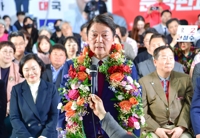 PPP lawmaker says entire Cabinet should resign over general elections defeat
PPP lawmaker says entire Cabinet should resign over general elections defeat
-
 Relax, immerse yourself in scents at Venice Biennale's Korean Pavilion
Relax, immerse yourself in scents at Venice Biennale's Korean Pavilion -
 Overdue debut of Korean abstract art pioneer Yoo Young-kuk at Venice Biennale
Overdue debut of Korean abstract art pioneer Yoo Young-kuk at Venice Biennale -
 Defense chief says N. Korea's hypersonic missile 'unsuccessful' in last-stage glide flight
Defense chief says N. Korea's hypersonic missile 'unsuccessful' in last-stage glide flight -
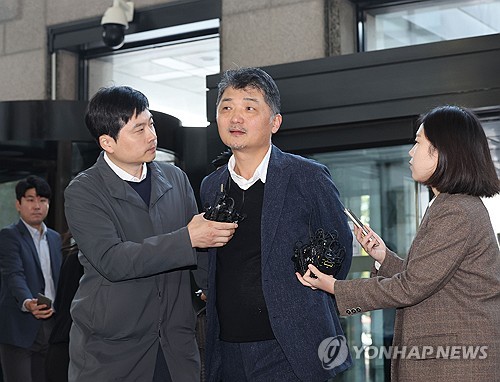 Questioning necessary for Kakao founder for suspected stock rigging: prosecution
Questioning necessary for Kakao founder for suspected stock rigging: prosecution -
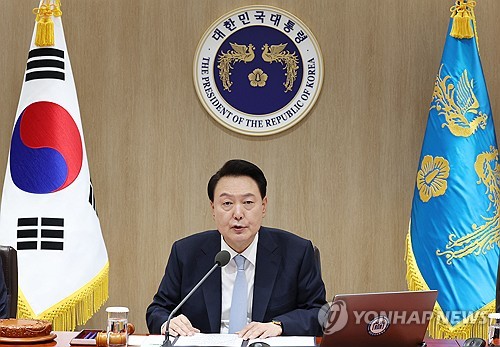 (LEAD) Yoon vows to improve communication with people after election defeat
(LEAD) Yoon vows to improve communication with people after election defeat
-
 S. Korea to provide 100,000 tons of rice to 11 nations
S. Korea to provide 100,000 tons of rice to 11 nations -
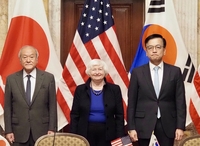 (4th LD) Finance chiefs of S. Korea, U.S., Japan recognize 'serious' concerns over 'sharp' won, yen depreciation
(4th LD) Finance chiefs of S. Korea, U.S., Japan recognize 'serious' concerns over 'sharp' won, yen depreciation -
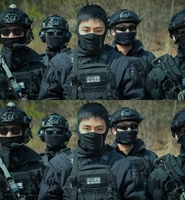 Facebook page unveils photos of BTS member V in counter-terrorism unit gear
Facebook page unveils photos of BTS member V in counter-terrorism unit gear -
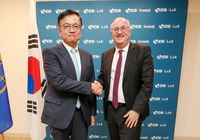 S. Korea to provide US$200 million in humanitarian aid to Ukraine this year
S. Korea to provide US$200 million in humanitarian aid to Ukraine this year -
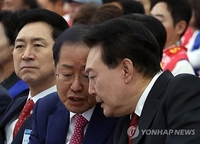 Yoon, Daegu mayor met to discuss post-election matters: sources
Yoon, Daegu mayor met to discuss post-election matters: sources



















